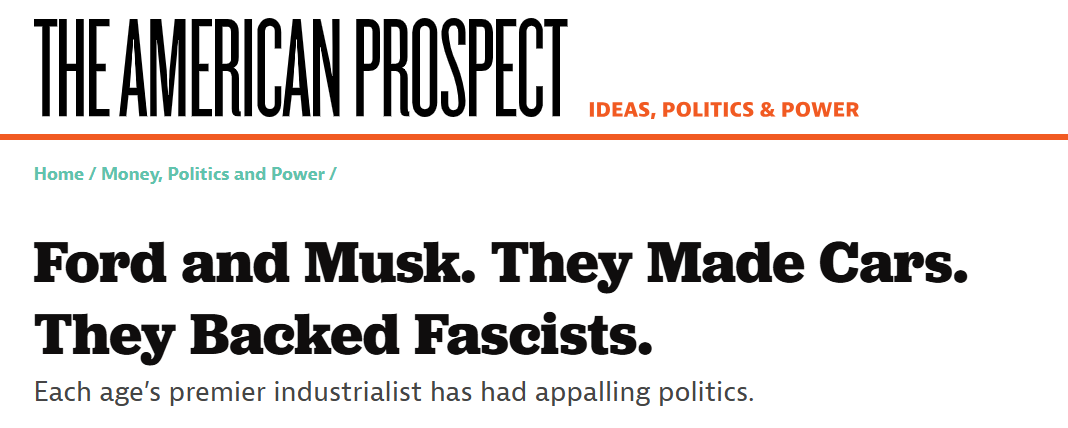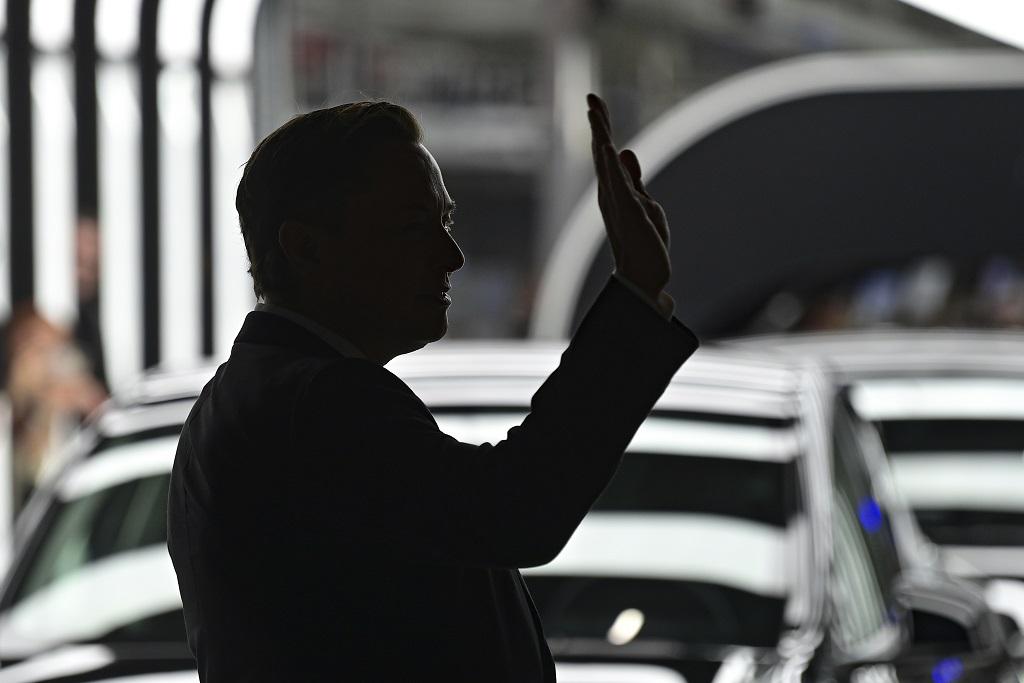Welcome to DU!
The truly grassroots left-of-center political community where regular people, not algorithms, drive the discussions and set the standards.
Join the community:
Create a free account
Support DU (and get rid of ads!):
Become a Star Member
Latest Breaking News
Editorials & Other Articles
General Discussion
The DU Lounge
All Forums
Issue Forums
Culture Forums
Alliance Forums
Region Forums
Support Forums
Help & Search
General Discussion
Related: Editorials & Other Articles, Issue Forums, Alliance Forums, Region ForumsFord and Musk. They Made Cars. They Backed Fascists.

https://prospect.org/power/2025-01-06-ford-musk-made-cars-backed-fascists/

Time was when a comparison of Henry Ford and Elon Musk would have focused on their respective roles in revolutionizing automaking. Ford manufactured the first cars priced at levels that enabled millions of people to purchase them, with the first factories that could mass-produce such products. Musk manufactured the first electric cars that, while not yet affordable to a truly mass market, were nonetheless built in sufficient quantity to give electric cars a substantial foothold in an economy slowly and tortuously turning away from fossil fuels. Would that were still the only way in which the two were comparable. Unfortunately, Musk has since joined Ford as the most prominent American employer of his era implacably opposed to unions. He also is recapitulating Ford’s backing of America First politicos while simultaneously committing major resources to manufacturing in a nation (for Ford, Germany; for Musk, China) posing the greatest threat to liberal democracies. Worse yet, Ford’s vociferous antisemitism helped to fuel the rise of German Nazism, while Musk has now gone all in to promote the rise of Germany’s neo-Nazis, who constitute much of the base of the AfD, which, to the alarm of millions of Germans, may finish second in that nation’s upcoming elections.
In different ways, Ford and Musk both transformed much of American life. Ford’s assembly-line mass production, which he began in 1913, converted the nation to a car culture over the next several decades. First, however, he had to create a stable workforce in his factory, since conditions were so dismal and the pay so low that employee turnover posed a challenge he had to overcome. In 1915, he was persuaded to raise worker pay to what was then an unheard-of $5 a day. Turnover dropped, production speed and volume increased, and the increased pay—which other companies eventually felt compelled to match—created a working class that could actually afford to buy the cars and other products they produced (though buying homes remained out of reach for many until the mass production industries were unionized in the 1930s and ’40s). Economic historians came to describe this mass production/mass consumption system as “Fordism.” There isn’t yet a system we could call Muskism; indeed, Muskism suggests chaos more than system. Musk, however, has extended his chops to companies (SpaceX, Starlink) in multiple industries, as Ford was never eager to do (he had to be persuaded, as World War II came to America, to build airplanes). Industrially, Musk, to use philosopher Isaiah Berlin’s typologies, is a fox (who knows many things) while Ford was a hedgehog (who knows one big thing).
The problems with Ford and Musk concern not what they knew, but what they believed. Ford may have been the first industrialist to raise pay levels, but he was the last major industrialist in the years preceding our entry into World War II to vehemently, and violently, oppose unionization. While sit-down strikes waged by the United Auto Workers compelled General Motors and Chrysler to recognize their workers’ union in 1937, Ford used his “Service Department”—3,000 violent ex-cons and industrial spies—to suppress all attempts at unionization. When organizers from the UAW local headed by future UAW President Walter Reuther marched to Ford’s giant River Rouge factory in 1937, they were beaten by Ford’s thugs, in an attack that newspaper photographers recorded and sent across the nation. It was only in 1941, by which time the UAW had so aligned itself with Black Detroit workers by championing civil rights that Ford could no longer count on them to cross picket lines, and by which time Ford’s Service Department had become too notorious to the general public to unleash, that the UAW succeeded in unionizing Ford.

Musk hasn’t been compelled to hire thugs to clobber union organizers, but he’s hired law firms—the thugs’ latter-day equivalent—to effectively do the same. That’s standard management practice in today’s C-suites, of course, but Musk still stands out by having proclaimed, “I disagree with the idea of unions” in an interview with The New York Times’ DealBook. Musk has since put that disagreement into action by having SpaceX file suit against the National Labor Relations Board, which had alleged two instances of the company using illegal unfair labor practices. The suit contends that the NLRB itself is unconstitutional because its administrative courts rule on such cases—though all such rulings can be, and frequently are, then challenged in federal courts. In 1937, the Supreme Court upheld the constitutionality of the NLRB, which has ruled for and against employers and unions for the subsequent 87 years without facing a relitigation of its constitutionality. That, apparently, has not deterred Musk, nor has he been deterred from opposing the unionization of 50 Tesla mechanics in Sweden, where 90 percent of the workforce is unionized and where unions are foundational to the nation’s social contract.
snip
1 replies
 = new reply since forum marked as read
Highlight:
NoneDon't highlight anything
5 newestHighlight 5 most recent replies
= new reply since forum marked as read
Highlight:
NoneDon't highlight anything
5 newestHighlight 5 most recent replies
Ford and Musk. They Made Cars. They Backed Fascists. (Original Post)
Celerity
Jan 2025
OP
2naSalit
(100,022 posts)1. Heh...
I disagree with his continued existence on this planet.